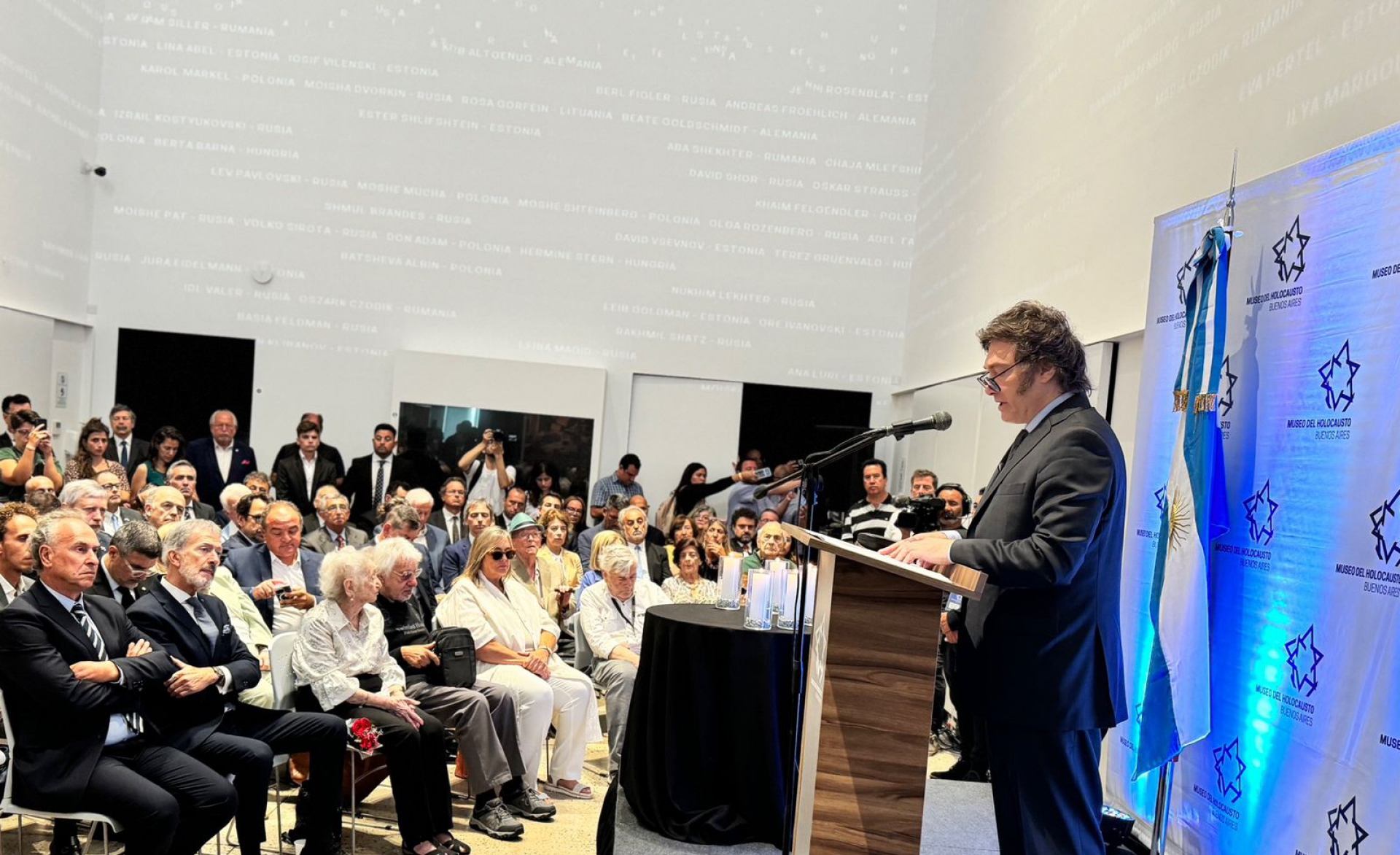President Javier Milei took part today in the commemoration of the International Day of Remembrance of the Victims of the Holocaust, 79 years after the liberation of the Nazi concentration and extermination camp of Auschwitz-Birkenau, in which he ratified that "Argentina does not remain silent in the face of Hamas terror", and demanded "the immediate release of all kidnapped civilians, including our 11 compatriots".
In the context of the date of the Soviet arrival at the Nazi concentration and extermination camp of Auschwitz-Birkenau in 1945, the President affirmed that "what has been destroyed can be built again. The Holocaust and the Nazis are not a thing of the past, the event of 7 October is a warning and we have an obligation to ensure that nothing like this ever happens again," and added: "Thanks to this museum we are building the present and the future.
In addition, survivor Eva Fono de Rosenthal gave a testimony of her life, pointing out that 2024 marks the 80th anniversary of the deportation of Jews from Hungary and that this is the first act after the Hamas terrorist attack in Israel on 7 October. "The world can no longer remain silent in the face of these atrocities. It is our mission and obligation to tell, because we witnessed one of the darkest episodes in history. Our testimony is one of the most powerful tools to prevent it from happening again," he said.
The president of the Delegation of Argentine Israelite Associations (DAIA), Jorge Knoblovits, stressed that "commemorating a new anniversary of the Shoah at a time when another totalitarian and criminal regime is rising up against the Jews and their national home, Israel, is not just a coincidence, it is an alarm, a siren that should pierce the ears of all humanity and awaken the consciences of every man and woman in every corner of the planet".
The Head of State was accompanied by the Chancellor Diana Mondino; the Ministers of Defence, Luis Petri, and Justice, Mariano Cúneo Libarona, and the Minister of Human Capital, Sandra Pettovello, as well as the Head of the Buenos Aires Government, Jorge Macri, and the President of the Holocaust Museum, Marcelo Mindlin.
The presidents of the Holocaust Museum and the representatives of the Asociación Mutual Israelita Argentina (AMIA) Ruth Fainzylberg and Leonardo Chullmir, as well as Holocaust survivors and representatives of Jewish and anti-Semitic organisations also took part.
During the event, in which the traditional candle lighting ceremony took place, Holocaust survivors Mónica Dawidowicz, Manfredo Leopoldo Dziubek, Marion Eppinger, Eva Fono Rosenthal, Andre Gategno, Helene Gutkowksi, Tomás Kertesz, Noelly were present Talgham, Lea Zajac Novera, Mariette Diamant, Pedro Roth, Jorge Kappel, Victor Woma Barg, Rebeca Szuchman de Sztjnahart, Marysia Szefner, Alberto Danon, Claudia Piperno, Pedro Lievendag and Izy Levenzon.
Also present were officials from the ministries of Foreign Affairs and Worship; of Justice; and Human Capital, together with diplomatic representatives from Germany, Austria, Belgium, Brazil, Bulgaria, Canada, Cyprus, Croatia, Slovakia, Slovenia, Spain, United States, Finland, France, Greece, Hungary, Ireland, Israel, Italy, Norway , New Zealand, Netherlands, Poland, Portugal, United Kingdom, Romania, Serbia, Sweden, Turkey, the European Union and Uruguay.
Finally, were part of the ceremony were representatives of the IHRA Local Chapter, Alejandro Zuchowicki (DAIA); Ariel Gelblung (Simon Wiesenthal Center); Anna Diamond (ICUF); Marcelo Horestein (ICUF); Eugenia Carbon (Auschwitz Institute); Ruth Feinzilberg (AMIA); Leonardo Chullmir (AMIA); Hector Shalom (House Anna Frank); Susan Chalon (B’nai B’rith); Batia Nemirovsky (COORDIEP); Veronica Silbergleit (FACCMA); Javier Gustavo Suez (Tzedaka); Betina Rosental (Tzedaka); Martha de Antueno de Vergara (Argentine Jewish Christian Cofraternity); Marisa Braylan (DAIA) and Paula Schreier of Vainer (Bama).
The ceremony also featured a musical number in charge of Yanina Meller and Diego Rubinstein, who sang “Honoring Life” and “Eli Eli”.
January 27: International Holocaust Remembrance Day
Every January 27, International Holocaust Remembrance Day is commemorated on the occasion of the liberation of the Nazi concentration and extermination camp of Auschwitz-Birkenau, which occurred in 1945.
On November 1, 2005, the United Nations General Assembly adopted resolution 60/7 to designate January 27 as International Holocaust Memorial Day and to reject any means of denying its existence.
This resolution arises from the Universal Declaration of Human Rights, which condemns all forms of “religious intolerance, incitement, harassment or violence against individuals or communities, on the basis of their ethnic origin or religious belief” throughout the world.
Every year the international community remembers and honors the six million Jewish people who died in the Holocaust and the millions of victims of Nazism.
In 1979 Auschwitz-Birkenau, the largest concentration camp, was declared a world heritage site by UNESCO and today functions as an emblematic site of memory worldwide.






